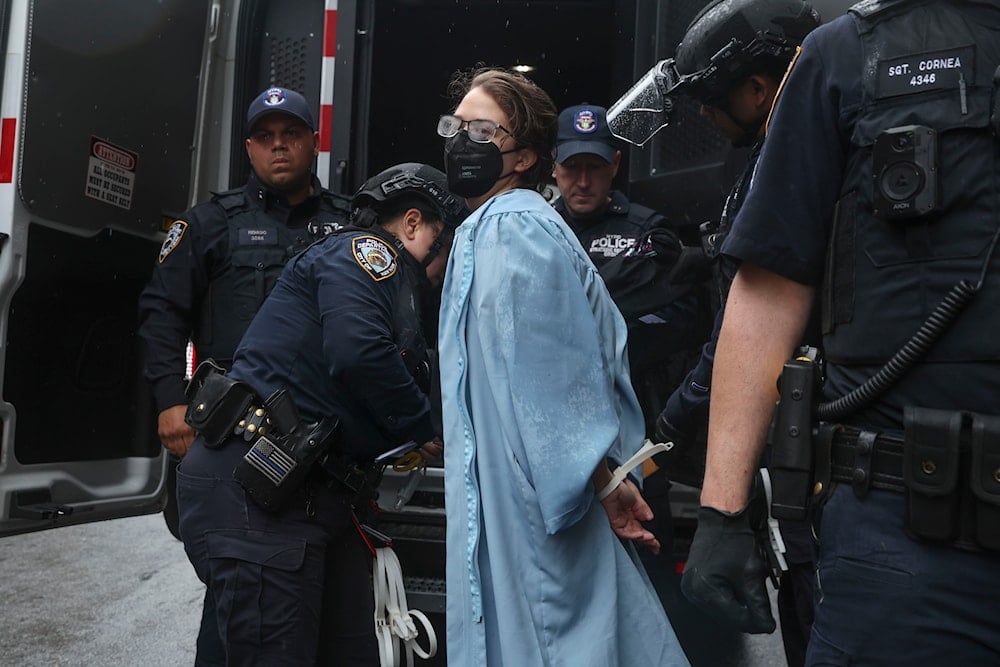Columbia yields to federal pressure, adopts IHRA to regain $400M funds
Critics warn Columbia’s adoption of the IHRA definition could silence dissent, restrict speech on the Israeli occupation, and marginalize pro-Palestine voices.
-

A person wearing graduate robes is detained by police across the street from the main gates of Columbia University, Wednesday, May 21, 2025, in New York. (AP)
Columbia University has formally adopted a disputed definition of antisemitism as part of an effort to unfreeze more than $400 million in federal grants that were suspended over allegations the school failed to adequately protect Jewish students.
This comes at a crucial time when students all over the United States are protesting the Israeli genocide of the Palestinian people in the Gaza Strip.
The updated definition will adopt the definition of antisemitism created by the International Holocaust Remembrance Alliance (IHRA). If eventually enforced, the definition would mark a grave turn of events for American citizens and residents opposing the Israeli occupation. The IHRA has spread dangerous rhetoric in which any action against the "state of Israel" would be considered anti-semitism.
In a message circulated campus-wide, Acting President Claire Shipman confirmed that the university will now integrate the International Holocaust Remembrance Alliance (IHRA) definition of antisemitism into its anti-discrimination policies. The decision comes amid growing federal scrutiny and pressure from the Trump administration, which initiated the freeze by citing civil rights violations under Title VI of the Civil Rights Act.
“Columbia is committed to taking all possible steps to combat antisemitism,” Shipman wrote. “The University remains dedicated to ensuring that complaints of discrimination and harassment of all types, including complaints based on Jewish and Israeli identity, are treated in the same manner.” She added that adopting the IHRA framework will help the institution “strengthen our approach to combating antisemitism.”
Contested definition raises academic freedom concerns
The IHRA definition describes antisemitism as “a certain perception of Jews, which may be expressed as hatred toward Jews.” Though widely adopted by the US State Department and several European institutions, critics argue it blurs the line between antisemitism and legitimate political criticism of "Israel".
Among the examples of criticisms accompanying the definition are “claiming that the existence of a State of Israel is a racist endeavor”, “applying double standards by requiring of [Israel] a behavior not expected or demanded of any other democratic nations” and “accusing Jewish citizens of being more loyal to Israel … than to the interests of their own nations”.
Academic freedom advocates and Palestinian rights groups have warned that this definition may be used to censor speech critical of the Israeli occupation and suppress solidarity with Palestinian students.
Federal pressure escalates, Harvard sets precedent
The Trump administration made the IHRA definition a cornerstone of federal civil rights enforcement in 2018 through an executive order mandating its use in Title VI investigations. Columbia’s move follows in the footsteps of Harvard University, which earlier this year adopted the same definition as part of a legal agreement with Jewish students alleging systemic neglect of their civil rights.
While Harvard’s case remains unresolved and its federal funds are still frozen, Columbia has taken a different route. A preliminary agreement reached in March reportedly includes extensive institutional reforms, from tighter regulations on campus protests to new oversight mechanisms in its Middle Eastern studies department, a key point of contention for federal investigators.
Shipman dismissed claims that the university’s decision amounts to political capitulation. “We are following the law,” she said. “The fact that we’ve faced pressure from the government does not make the problems on our campuses any less real.”
Leadership turmoil and looming financial settlement
Columbia faced mounting backlash last year after then-president Minouche Shafik authorized the NYPD to dismantle a pro-Palestine encampment protesting the Israeli genocide in Gaza. The crackdown provoked strong criticism from students, faculty, and lawmakers, ultimately leading to her resignation.
Shipman acknowledged that the university’s March agreement with federal officials is “only a starting point for change.” She emphasized that institutional reform must come from within, stating, “Committing to reform on our own is a more powerful path. It will better enable us to recognize our shortcomings and create lasting change.”
According to a recent report by The New York Times, Columbia is also nearing a deal to pay over $200 million in compensation to Jewish complainants, which could serve as a major step toward restoring access to federal grants. While final details are still being negotiated, sources say the agreement may drop a previously proposed consent decree that would have granted the Trump administration long-term oversight over the university’s operations.
As Columbia navigates this high-stakes dispute, the university faces the complex task of complying with federal demands while striving to uphold academic freedom and campus integrity, resisting mounting pressure from pro-"Israel" lobbying groups amid deepening political and ideological divides.
Read more: Australia eyes law that may police campus speech on 'Israel'

 5 Min Read
5 Min Read








